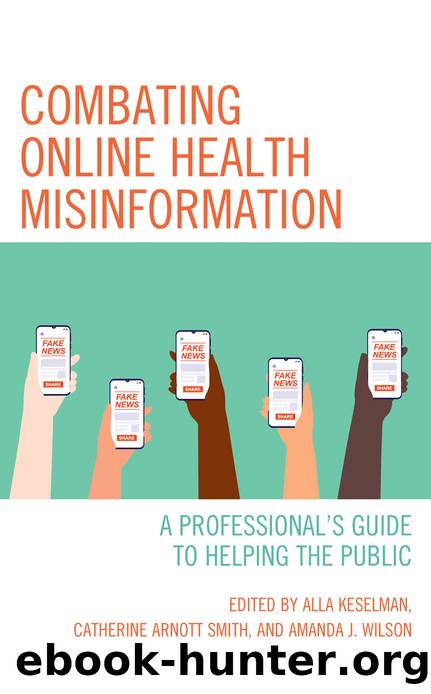Combating Online Health Misinformation by Alla Keselman & Catherine Arnott Smith & Amanda J. Wilson

Author:Alla Keselman & Catherine Arnott Smith & Amanda J. Wilson
Language: eng
Format: epub
Publisher: Rowman & Littlefield Publishers
Published: 2022-08-26T00:00:00+00:00
Public Understanding of the Nature of Science and Uncertainty
Trust in science has to be linked to a certain vision of science, the kind of questions it addresses, the perceived likelihood of errors and controversies, and ways to handle them. This vision is usually acquired through Kâ12 school science education. Unfortunately, the way the scientific process is taught in schools is rather different from the process as it is practiced by scientists; science taught in schools is reduced to simple modelsâlinear and idealized (Fensham 2012; Zeyer 2021). Researchers in the growing field of science/environment/health point out that over 90 percent of school science focuses on simple problems, such as predicting an outcome from a few well-defined known variables. In contrast, the most pressing twenty-first-century problems, largely related to health and the environment, are very complex, with a high degree of uncertainty in the models (Fensham 2012; Zeyer 2021). Moreover, real-world science is an evolving process that, like all human enterprises, is open to errors, biases, and special interests. In recognition of those risks, science has developed corrective mechanisms that include experimental controls, peer review, and attempts at replication of findings. Consensus is built through dialogue and may never be quite reached on all the nuances.
When trust in science is connected to a simplistic vision of science, there is a risk of disillusionment. When people hold such simplistic visions, they expect science to provide certainty and feel disappointed by scienceâs failure to make an accurate prediction or a lack of consensus among scientists. Scientific debate may then signify to them that science is flawed and unreliable. Vested interests exploit this unrealistic vision of science, stressing uncertainty and lack of consensus on certain issues as a way to influence public opinion about large areas of study. Interest groups (e.g., tobacco and climate) fuel suspicion about uncertainty, presenting scientific debate as abnormal and exaggerating disagreement among scientists (Solomon 2021).
The publicâs difficulty in understanding and accepting uncertainty poses a problem for the media and public health. Kreps and Kriner (2020) note two ways in which media can deal with uncertainty: (1) acknowledging and addressing it and (2) presenting the public with a simplification. Kreps and Kriner (2020) studied the effect of scientific uncertainty surrounding COVID-19 on the public trust. They found that âacknowledging and explaining the uncertainty embedded in models does not increase trust for science and its role in policymaking.â They also found âconditional evidence that criticism of COVID-19 science emphasizing uncertainty can erode public confidence in some contexts.â
Johnson and Slovic (1995) studied the impact of discussing risk magnitude uncertainties of environmental hazards on respondentsâ perception of an environmental agency. They found that while reporting uncertainty increased the perception of an agencyâs honesty, about a third of the participants viewed such reports as a sign of incompetence. Perception of honesty did not offset the perception of incompetence, as it was possible to view the agency as more honest and less competent simultaneously. Those with a better understanding of uncertainty in science were more likely to view reporting uncertainty as a sign of honesty and not incompetence.
Download
This site does not store any files on its server. We only index and link to content provided by other sites. Please contact the content providers to delete copyright contents if any and email us, we'll remove relevant links or contents immediately.
Phoenicians among Others: Why Migrants Mattered in the Ancient Mediterranean by Denise Demetriou(608)
american english file 1 student book 3rd edition by Unknown(608)
Verus Israel: Study of the Relations Between Christians and Jews in the Roman Empire, AD 135-425 by Marcel Simon(592)
Caesar Rules: The Emperor in the Changing Roman World (c. 50 BC â AD 565) by Olivier Hekster(578)
Basic japanese A grammar and workbook by Unknown(574)
Europe, Strategy and Armed Forces by Sven Biscop Jo Coelmont(520)
Give Me Liberty, Seventh Edition by Foner Eric & DuVal Kathleen & McGirr Lisa(497)
Banned in the U.S.A. : A Reference Guide to Book Censorship in Schools and Public Libraries by Herbert N. Foerstel(492)
The Roman World 44 BC-AD 180 by Martin Goodman(478)
Reading Colonial Japan by Mason Michele;Lee Helen;(469)
DS001-THE MAN OF BRONZE by J.R.A(462)
Introducing Christian Ethics by Samuel Wells and Ben Quash with Rebekah Eklund(456)
Imperial Rome AD 193 - 284 by Ando Clifford(454)
The Oxford History of World War II by Richard Overy(454)
The Dangerous Life and Ideas of Diogenes the Cynic by Jean-Manuel Roubineau(452)
Catiline by Henrik Ibsen--Delphi Classics (Illustrated) by Henrik Ibsen(427)
Language Hacking Mandarin by Benny Lewis & Dr. Licheng Gu(410)
Literary Mathematics by Michael Gavin;(407)
Brand by Henrik Ibsen--Delphi Classics (Illustrated) by Henrik Ibsen(390)
